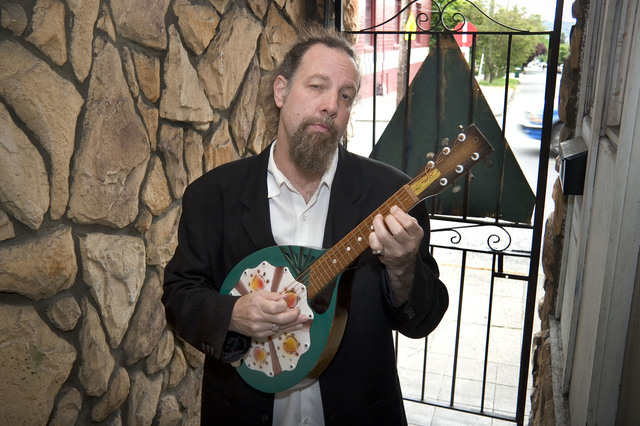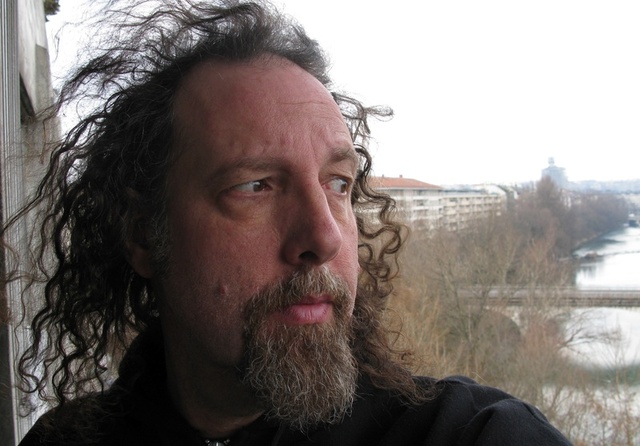Ethno-improv trickster trio Sun City Girls never achieved mainstream success but, beginning in 1979, the esoteric experimental rock act attracted a small but passionately devoted fan base. When drummer Charles Gocher lost a protracted battle with cancer in 2007, the group disbanded. Founding SCG member and guitar virtuoso Richard Bishop began intensely focusing on solo work, and he’s released 12 albums in the last five years. Along with his brother, Alan Bishop, and Hisham Mayet, Richard co-founded Sublime Frequencies, a Seattle-based label which acquires and provides exposure for obscure sights and sounds from urban and rural frontiers—both modern and traditional—in the Middle East, North Africa and Southeast Asia. Bishop is touring with transcendent drone-metal duo Om, and this sublime show—also featuring solo Jeremy Barnes—inhabits Sister (409 Central NW) on Valentine’s Day. The Alibi communed with Bishop via email.Hearing your work, it’s difficult to believe you never formally studied music. How would you describe your sonic education?Trial and error and endless experimentation. That’s the best way for me to come up with new ideas. I have always had problems trying to sit down and consciously write songs. For me, things just have to happen organically. I never practice anything. I just pick up the guitar and play and see where it leads. Besides, there’s no way to practice things that haven’t been created yet. Why do you gravitate toward improvisation?I often find myself getting too comfortable if I play the same thing over and over again. Improvising can keep me in a different state of creation and it forces me to try new things. It doesn’t always work out like I want it to, but I like not knowing what is going to happen next. The uncertainty of how things will turn out is satisfying. I can still play many of the same pieces every night if I want to. Most of these pieces have a lot of open space within them, and that allows me to fill those spaces with different things each time so that the songs are never the same. In fact, sometimes they turn into entirely different pieces. It’s a way to develop new ideas out of old ones, and it gets to the point where everything is changing all the time.You’ve attributed your continued interest in mysticism and magic to a curiosity about shadowy areas of belief and ritual and a family affiliation with Freemasonry. How do you define magic, and is it part of your everyday life?Magic will always mean different things to different people so establishing any definition will be subjective. I have always thought of magic as recognizing, understanding, and being able to work with specific energies that are present throughout the universe. Many names have been used to describe such energies by different cultures throughout history. These are handy for reference, but said energies exist no matter how they are referred to. The more one studies and attempts to understand the history of the occult arts, the more likely it is that one will absorb the essences of the ideas and energies involved. Once that happens, it can become part of your everyday thought process and has every potential to inform the way you live your life. How are stateside and world audiences different?I enjoy playing shows in Europe the most and it’s partly because I feel the audiences pay more attention to what’s going on. They are there to listen whereas sometimes in the U.S. it seems that people just show up because it is the place to be that particular evening. It’s more of a social event than a musical one. I certainly don’t mind playing in the states, but if I ever had to make a choice, I would probably focus on Europe or Japan. You’ve called your late-’80s to early-’90s fascination with Crowley a “dark, icky” thing. Lately, I’ve been pondering whether certain musicians’ (ex. Tony Wakeword, Doug Pearce, Boyd Rice, etc.) affiliation with or dabbling in Golden Dawn and other neo-fascist ideologies is something it’s critical to disavow. Do you think an artist or musician’s beliefs should influence one’s appreciation of their work?Personal beliefs are certainly capable of influencing one’s appreciation but I don’t think it is absolutely necessary. There are no rules here that can apply across the board. It’s entirely up to each individual whether or not they want to incorporate their interpretation of an artist’s beliefs into their own understanding of the artist’s work. My view is that if the work is good, or at least unique and somewhat different, it can eventually stand on its own regardless of any belief system. Additionally, I don’t think any artist or musician needs to disavow anything unless their beliefs or thought processes have changed considerably and they truly regret engaging in whatever it was they were dabbling with. I have always had a great respect for Crowley. Hey, his mother’s name was Bishop—maybe we’re related. It’s some of his followers that get on my nerve from time to time, mainly because a majority of them are completely full of shit and totally ill-informed. The rest of them aren’t talking, and those are the ones I respect. But I don’t regret studying his work at all. I’ve learned a lot by doing so. And though it could be endlessly debated as to whether or not he was a successful magician, it really doesn’t matter. His literary output and his ardent devotion to the Great Work can never be surpassed, and that will keep his legacy alive for as long as people have access to his works. But for me, I have always been more inspired by Crowley’s travels and his general life of adventure, than by any of his so-called magical accomplishments. Is there a particular Vodun loa who resonates with you more strongly than others? Actually, I am not well acquainted with most of the loas. Besides the Baron, it is only Legba, Erzulie, and Dhambhalla that I am somewhat familiar with but only on the most basic of levels. I’ve learned not to play favorites. Any recent earworms?Just the voices in my head, demons screaming, that kind of thing. That’s been going on for years.
Sir Richard Bishopwith Om and Jeremy BarnesThursday, Feb. 14, 10 p.m.Sister407 Central NW$10, 21+sisterthebar.com











